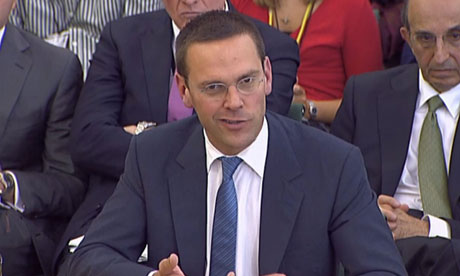
21 July 11
 ames Murdoch has been accused of misleading the parliamentary select committee this week in relation to phone hacking, igniting yet another fire for the embattled News International boss to extinguish.
ames Murdoch has been accused of misleading the parliamentary select committee this week in relation to phone hacking, igniting yet another fire for the embattled News International boss to extinguish.
In a highly damaging broadside, two former News of the World senior executives claimed the evidence Murdoch gave to the committee on Tuesday in relation to an out-of-court settlement to Gordon Taylor, chief executive of the Professional Footballers Association, was "mistaken."
The statement came as something of a bombshell to the culture, sport and media select committee, which immediately announced it would be asking Murdoch to explain the contradiction.
Colin Myler, editor of the paper until it was shut down two weeks ago, and Tom Crone, the paper's former head of legal affairs, said they had expressly told Murdoch of an email that would have blown a hole in its defence that only one "rogue reporter" was involved in the phone-hacking scandal.
This contradicts what Murdoch told the committee when questioned on Tuesday.
The existence of the email, known as the "for Neville" email because of its link to the paper's former chief reporter Neville Thurlbeck, is thought to have been critical in News International's decision to pay out around £700,000 to Taylor in an out-of-court settlement after he threatened to sue the paper.
James Murdoch is standing by his version of events. A statement issued by News Corporation said: "James Murdoch stands by his testimony to the select committee."
In their statement, Myler and Crone challenged this: "Just by way of clarification relating to Tuesday's Culture, Media Select Committee hearing, we would like to point out that James Murdoch's recollection of what he was told when agreeing to settle the Gordon Taylor litigation was mistaken.
"In fact, we did inform him of the 'for Neville' email which had been produced to us by Gordon Taylor's lawyers."
John Whittingdale, the chairman of the culture, sport and media select committee, said: "We as a committee regarded the 'for Neville' email as one of the most critical pieces of evidence in the whole inquiry. We will be asking James Murdoch to respond and ask him to clarify."
He added that "it was seen as one of the few available pieces of evidence showing that this activity was not confined just to Clive Goodman," the only journalist on the paper to have been prosecuted - and jailed - in relation to phone hacking so far.
The email is believed to have been critical in News International's decision to pay Taylor such a large sum of money.
If it had got out in a full-blown court case brought by the Profession Footballers' Association chief executive it would have blown a hole in News International's claim that only one reporter was involved in hacking.
James Murdoch claimed to the MPs that this email had been concealed from him by two company executives, Crone and Myler, when he was persuaded to sign off the secret deal with Taylor.
Earlier this month James Murdoch acknowledged he was wrong to settle the suit, saying he did not "have a complete picture of the case" at the time.
He repeated this on Tuesday at the select committee when he was asked by Labour MP Tom Watson: "When you signed off the Taylor payment, did you see or were you made aware of the full Neville email, the transcript of the hacked voicemail messages?"
To this James Murdoch answered: "No, I was not aware of that at the time."
Watson went on to ask him why then had he paid an "astronomical sum" to Taylor.
James Murdoch replied: "There was every reason to settle the case, given the likelihood of losing the case and given the damages - we had received counsel - that would be levied."
With parliament in recess, it is unlikely but not unprecedented for a select committee to hold a special evidence session to clarify the issue.
Witnesses in the case have been given very strict instructions before giving evidence to tell the truth, although witnesses do not give evidence under a specific oath.
James Murdoch told the committee that his advisers had urged him to adopt a strategy of telling the truth when he spoke to the committee.
In its 2010 report the culture, sport and media select committee, in discussing the Gordon Taylor settlement, wrote: "The settlements were authorised by James Murdoch, executive chairman of News International, following discussions with Colin Myler and Tom Crone."
It did not specifically state whether Murdoch had been shown the "for Neville" email before making the settlement, but does state Murdoch was authorised to make the payment without bringing the issue to the News International board.

Any bets on the Murdoch family tree?